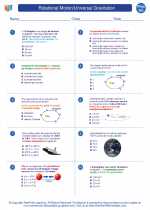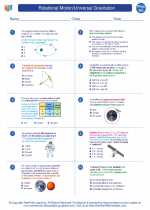Charles's Law
Charles's Law is a fundamental principle in the field of thermodynamics and is one of the gas laws that describes how gases tend to expand when heated. It is named after the French scientist Jacques Charles, who first formulated it in the 18th century.
Statement of Charles's Law
Charles's Law states that at constant pressure, the volume of a given mass of gas is directly proportional to its absolute temperature.
This can be mathematically expressed as:
V ∝ T
Where V is the volume of the gas and T is its absolute temperature (measured in Kelvin).
Alternatively, the law can be stated as:
V1 / T1 = V2 / T2
Where V1 and T1 represent the initial volume and temperature of the gas, and V2 and T2 represent the final volume and temperature, respectively.
Implications of Charles's Law
Charles's Law implies that as the temperature of a gas increases, its volume also increases, and vice versa. This behavior can be observed in many real-world scenarios, such as the inflation of a balloon when exposed to heat or the decrease in tire pressure during cold weather.
Applications of Charles's Law
Charles's Law has several practical applications in various fields, including:
- Hot air balloons: Understanding the relationship between temperature and volume is crucial for the operation of hot air balloons, as they rely on heating the air inside the balloon to generate lift.
- Thermometers: The expansion of a gas (such as mercury) in response to temperature changes is governed by Charles's Law and is exploited in the design of thermometers.
- Gas storage and transportation: Knowledge of how gases expand with increasing temperature is important for the safe storage and transportation of compressed gases.
Study Guide for Charles's Law
Here are some key points to remember and questions to consider when studying Charles's Law:
- What is the relationship between the volume of a gas and its absolute temperature according to Charles's Law?
- How does the behavior of a gas at constant pressure differ from that at constant volume (as described by Boyle's Law and Gay-Lussac's Law)?
- What are some practical examples of Charles's Law in everyday life?
- How can the mathematical expression of Charles's Law be used to solve problems involving changes in temperature and volume of a gas?
- What are the limitations of Charles's Law and under what conditions does it hold true?
Understanding Charles's Law is essential for comprehending the behavior of gases and for numerous applications in science and engineering.
.◂Physics Worksheets and Study Guides High School. Rotational Motion/Universal Gravitation

 Worksheet/Answer key
Worksheet/Answer key
 Worksheet/Answer key
Worksheet/Answer key
